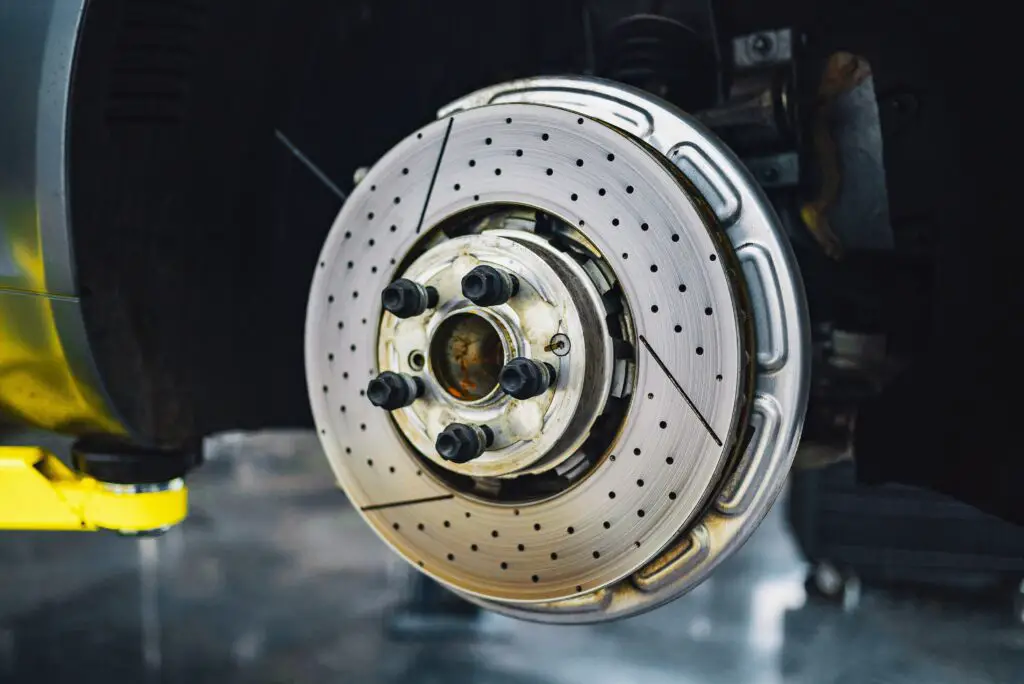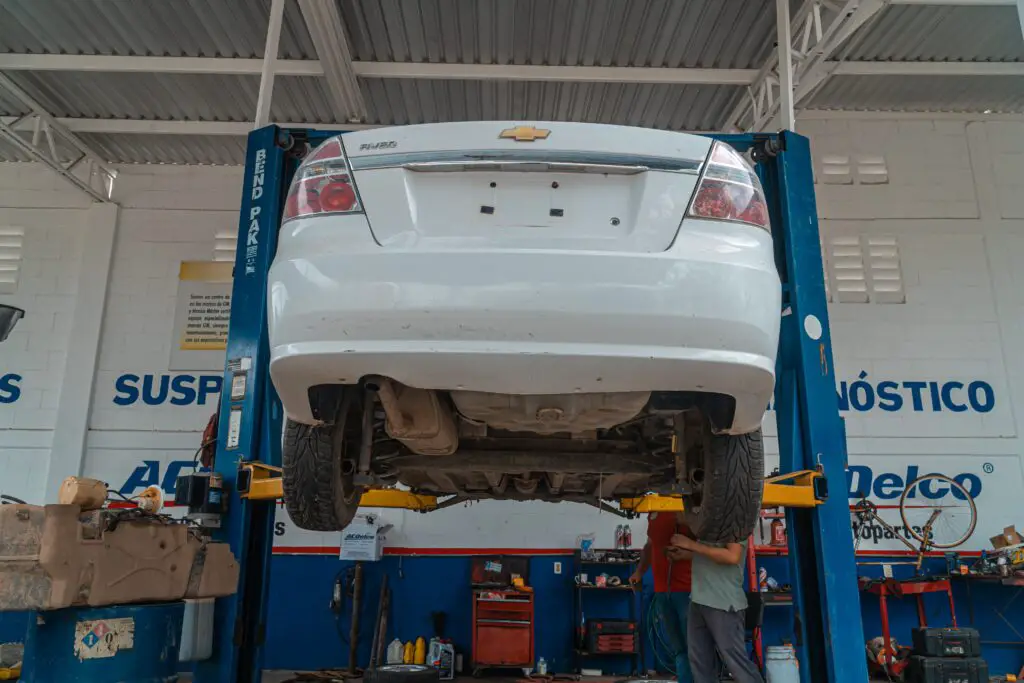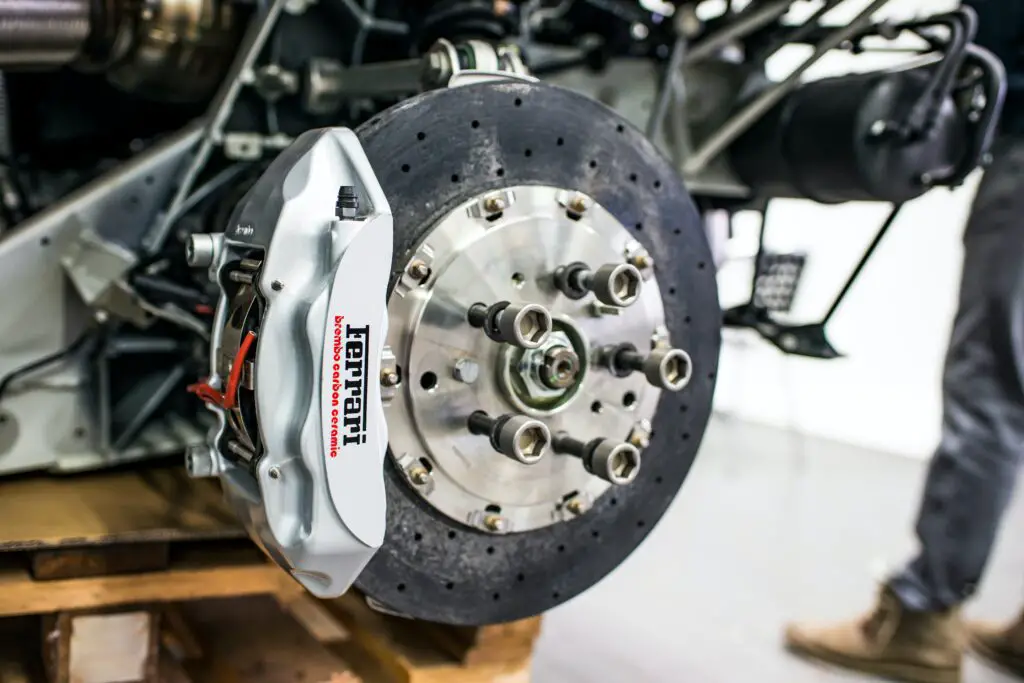That irritating high-pitched brake squeal every time you shift into reverse can make anyone cringe. Why do brakes squeaking only in reverse? This in-depth guide dives into the nuances of reverse-specific brake noise, thorough diagnostic tips, complete repair instructions, and best practices for smooth quiet braking.
Brake squeals, chirps, and squeaks have a handful of known causes. But noise only in reverse helps narrow down the likely culprits. Let’s delve into why reverse duty awakens your brakes’ angry side.
5 Common Reasons for Brakes Squeaking Only In Reverse
A few key mechanical issues manifest predominantly in reverse:
Worn Pads and Rotors
Over time, pads and rotors develop distinct wear patterns from normal forward braking forces. The opposing friction directions in reverse allow the smoothed wear surfaces to interact differently, activating squeals and vibrations.
Contaminant Buildup
Dust, dirt, and debris accumulate on stationary brakes as you drive. They are rotating in reverse rubs those debris deposits against the rotor differently, causing vibrations and high-pitched squeals.
Sticking Calipers
Corroded or bent slide pins prevent caliper pistons from fully retracting. This causes uneven pad contact with the rotor predominantly in reverse as pistons stick until back-rotated.
Loose Components
The change in dynamic forces while reversing can exacerbate noise from any loose caliper bolts, worn rubbers, or damaged splash shields.
Noise Amplification
The unique resonance frequencies of brakes in reverse can amplify certain noise bands that go unnoticed in forward travel.
Now let’s explore nuances between straight reverse and turning reverse that isolate the root cause.
Variances Between Straight and Turning Reverse
Subtle differences in noise while reversing straight back versus turning while reversing help zero in on the culprit:
Straight Back Squeal
Even pad and rotor wear combined with debris buildup commonly causes constant noise reversing straight back.
Turning Squeal
Brakes squeaking only in reverse. Loose components are more prone to revealing themselves during the weight shifts of turning while reversing. The added torsion amplifies problem spots.
Exacerbating factors like moisture or rust become more evident when reversing turns, as contamination gets rubbed clean. Compare noise at various speeds and brake pressures too. Meticulous testing isolates the misbehaving parts.
Risks of Ignoring Intermittent Brake Squeals
It’s tempting to disregard occasional squeaking when briefly reversing. But overlooking subtle noises allows accelerated wear and potential hazards:
Rapid Deterioration
The vibration of braking components causes destructive oscillating forces within pads, rotors, and calipers. This heat and stress glaze pads faster, damages rotors, and strains mounting points.
Compromised Safety
Pulsating pedals from warped rotors reduce stopping power. Stripped slide pins prevent full caliper piston retraction. Both these scenarios introduce braking defects.
Runaway Damage
Splash shields help protect rotors from gravel and water. But broken retainers allow shields to fall away entirely, exposing brakes to even more contamination and damage.
Addressing even occasional squeaks improves brake system durability, performance, and safety. Don’t ignore early warning signs of developing issues.

Step-by-Step Diagnosis of Brakes Squeaking Only In Reverse
Listen closely and conduct targeted inspections to pinpoint the true cause:
Isolate Side
Note whether the squeal emanates from one side or both. Unilateral noise indicates an issue with that specific corner’s caliper, pads, or rotor.
Check Wear Patterns
Inspect pads and rotors for uneven tapering, grooves, and thickness variations that interact differently when rotated in reverse.
Assess Hardware
Confirm guide pins can fully retract and lubricate dust seals if sticking. Check rubbers and splash shield retainers for deterioration allowing looseness and vibration.
Identify Looseness
Watch components closely during reverse stops to identify any extra movement indicating worn parts or inadequate torque specs.
Review Recent Service
Ask when the pads and rotors were last replaced. New pads take time to properly bed in and seat rotor surfaces. Premature noise can mean improper initial bedding.
By methodically checking likely causes, you can quickly diagnose why reverse provokes your brakes to sing.
https://youtu.be/Id0fDuxb4t8
Comprehensive Brake Repair Procedures
If worn pads, rotors, or contaminated friction surfaces are the culprit:
New Pads and Rotors
Always replace pads in complete axle sets to prevent mismatch. Cross-hatched or dimpled rotors provide extra bedding grip. Consider ceramic pads for squeal resistance.
Patterned Rotors
Slotted, drilled or dimpled rotors maintain cleaner pad surfaces by allowing dust passage. This reduces debris packing into pad edges.
Anti-Squeal Compound
Synthetic lubricant pastes or graphite sprays on pad backing plates minimize vibration and noise. Never lubricate friction surfaces.
Secure Hardware
Inspect and replace any deteriorated rubber components. Properly torque all mounting hardware to specification.
Bed in Brakes
Follow pad bedding-in steps like moderate stops from speed and cool-down intervals to transfer material evenly before hard braking.
With fresh components properly installed, bedded, and lubricated, your brakes will tolerate even reverse duty noise-free.
Preventing Rapid Brake Deterioration
You can significantly extend brake system longevity through proactive driving and maintenance habits:
Avoid Riding the Pedal
Resting your foot on the brake pedal during driving keeps pads lightly contacting the rotor, accelerating wear.
Allow Proper Cool Down Time
Let brakes fully cool after heavy use before continuing driving to relieve residual stresses from heat and friction.
Lubricate Slide Pins and Hardware
Keep caliper slide pins, bushings, and mounting points properly lubricated to prevent seizing and uneven pad wear.
Drive Smoothly
Limit abrupt unnecessary stops and starts which place added stress on brakes and hardware. Gradual smooth braking is ideal.
With attentive care, your brakes will stay quieter, and safer, and handle reverse duty with fewer complaints. Don’t tolerate pesky squeaks – diagnose and repair them promptly.
Don’t Let Reversing Ruin Your Day
Understanding the nuances of why Brakes Squeaking Only In Reverse allows accurate diagnosis and targeted repairs. Don’t automatically assume worn pads and rotors are the culprits without proper inspection. Methodically isolate the sound characteristics and conditions to reveal the real issue.
Whether worn parts, contamination, or something more obscure, address squeaks promptly before small nuisances turn into major repair headaches. With attentive troubleshooting and maintenance, you can gain the upper hand over intermittent reverse-specific brake noises. Read This Article for more information. Why Does Car Brakes Squeak In Reverse? [Reasons Explained]
Frequently Asked Questions
Why do my brakes squeak only in reverse?
Brake squeaking in reverse often occurs due to specific mechanical issues like worn pads and rotors, contaminant buildup, sticking calipers, loose components, or unique resonance frequencies that become more pronounced in reverse.
Why do my back brakes squeak when I back up?
Back brake squeaking during reverse can be attributed to factors such as uneven pad and rotor wear, debris buildup, sticking calipers, loose components, and the amplification of noise in reverse.
Why do my brakes squeak when I back up in the morning?
Morning brake squeaking in reverse can result from moisture or rust exacerbating noise as contaminants get rubbed off, similar to turning while reversing. It’s essential to consider factors like temperature and humidity.
Can you spray WD-40 on squeaky brakes?
While WD-40 can temporarily reduce brake noise, it’s not a recommended long-term solution. Proper maintenance and addressing the root causes of brake squeaking are more effective in the long run.
How do you lubricate brake pads?
Lubricating brake pads usually involves applying a specialized brake lubricant to the contact points between the pads and caliper, as well as any hardware like slide pins. This helps prevent noise and ensures smooth operation.
Will the brake fluid stop squeaking?
Brake fluid is not designed to stop brake squeaking. Brake squeaking is typically related to issues with pads, rotors, calipers, or contaminants. Brake fluid is essential for hydraulic brake system function and should not be used as a noise suppressant.
When I reverse and turn the wheel it makes noise.
When noise occurs during reverse and turning, it may indicate loose components, uneven wear, or the amplification of noise due to torsion. Careful testing and inspection can help identify the specific issue causing the noise.

